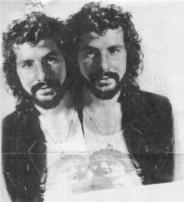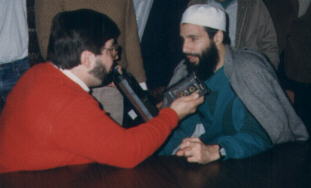Here is a wonderful Interview granted byYusuf and conducted by Harry
Katopodis , which appeared in the November/December 1987 issue
of GREEK ACCENT, a North American - Greek/American Magazine. Majicat was
lucky enough to catch the eye of Mr Katopodis, by which he has granted us the right
to reprint his article on Majicat.
The
Two 
Lives
Of Cat
IN THE LATE 1960S AND THE
1970s, Cat Stevens was a popular singer whose songs, about love and freedom, struck a
responsive chord in an entire generation. His real name was Steven Georgiou. He was born
in London, in 1948, to a Greek Cypriot father and a Swedish mother.
Stevens turned to writing
music while studying art in a school outside of London. Soon, he gave up his studies to
pursue a career as a singer. He had his first hit single, I Love My Dog, in 1966. In 1968,
however, he contracted tubercu1osis and had to be confined a year to a hospital,
where he wrote the album Mona Bone Jakon. In 1970 he released Tea for the Tillerman, which
quickly made the top ten in the United States and propelled him to superstar status.
Tillerman and the later Teaser and the Firecat are now classics.
Stevens continued to record
until 1978, when he suddenly dropped out of the music scene. His decision to abandon music
was the result of his conversion to the Muslim faith a year earlier, when he also changed
his name to Yusuf Islam. In 1979 he married a woman of Afghan and Turkish descent. Today,
he lives in Britain with his wife and four children and devotes most of his time to
teaching the Koran in Muslim schools.
In 1979, much to my
surprise, he responded to a fan letter I had sent him. I was curious to know what had
happened to him, so I began a correspondence that has lasted eight years. In his first
letter to me, he wrote: "I was searching for the highest treasure, and now I know
what that treasure is; it is the eternal face of God Himself." This past October I
finally got to meet him in person. He came to the University of Michigan in Ann Arbor,
near my home, to give a lecture; afterward he granted me an interview.
GREEK ACCENT: Now that you
are a Muslim and have left music, you seem to be much happier.
ISLAM: Yes, it’s not
just leaving music. It’s actually finding out a lot of things which I didn’t
know before. Perhaps, in my ignorance, I was pretending to be happy, but I wasn’t
really happy. Happiness is something which is very elusive in the world. It means a
balance in your mind, your body, and your spirit; and I’ve managed to find out how to
be happy through submission to one God— submitting my will. That is what Islam
literally means, submission.
GREEK ACCENT: How did your
family react when you embraced Islam?
ISLAM: In the beginning,
perhaps my family was slightly shocked; however, since Islam teaches that there is only
one God, my father in a way realized that this wasn t something so totally alien to what
we already believed. I think even as Christians know, we say that we believe in one God,
but there are some other connotations, perhaps, to the personality of Jesus—but
essentially it wasn’t that different. Also, Islam teaches you how to behave well with
your parents. My family got the benefit of that, and they started benefiting from my
change of personality. I started considering more, giving due attention to my parents and
my family. Islam also stops one from taking part in what would be considered unhealthy
activities. Overall, my life changed for the better, so that they naturally became very
happy with my change, and to some extent they have accepted the message of Islam as well.
GREEK ACCENT: Being partly
of Greek Cypriot heritage, did you find it a problem becoming a Muslim, since the Turks
are Muslims and the Greeks and Turks have been enemies for a long time?
ISLAM: Yes, I think in the
beginning we are all born with colored glasses, the ones which our parents put on for us.
They may not necessarily suit us. Eventually, I had to take off those glasses in order to
see what Islam was, but I later realized that it wasn’t necessarily connected with
being Turkish or Arab; one could be a British Muslim. Therefore, I realized the universal
message of Islam was above these nationalistic differences, and that’s what I believe
it is at the moment. I mean, if you look at Turkey today, it’s not really an
Islamic-guided society. At the same time, you can’t say that Greece is a completely
Christian-guided society. Therefore, we find that these conflicts arise mostly from
nationalistic differences.
GREEK ACCENT: Would you
ever get involved with the Cyprus situation~— for example, the more than 1,600
missing Greek Cypriots and so forth?
ISLAM: I don’t know
about that situation. I’d have to know more, but again, I feel that there are two
sides to the story. One has to be balanced, and I’m in an incredibly precarious
position. I have to be balanced on both sides. At the same time, I think that certain
rights for everyone should be acknowledged. And I don’t believe that there’s a
political situation out of there at the moment—perhaps there’s a religious one.
GREEK ACCENT: What is your
message to the fans of Cat Stevens?
ISLAM: My message would be
that if you like my music, then perhaps you 11 like my faith as well—the one which I
discovered, perhaps, through my music. I came to the conclusion that poets are all right
to a point, but eventually you’ll have to start living what you are preaching, and
that’s ,what I’ve tried to do as a Muslim.
IN THE QUESTION-AND-ANSWER
period that followed his lecture, he elaborated on his decision to withdraw from the music
industry and discussed whether he would ever sing again: As far as rejecting certain
songs, yes, I reject them now, because I’ve found a certain moral stance which
would naturally exclude certain things being acceptable. Basically, I think that one of
the most important characteristics of this religion [Islam] is sincerity-—first of
all to God, and then sincerity to people. I believe, by getting out of the music business
I was doing the best thing by not upholding those things which I don’t believe in
anymore, like the commercial aspects of that business, and creating a little bit of a
distance between the new me and them, even though essentially I’m the same person.
I needed some time to study
the religion. I had to learn. I had to study. I had to bring up a family. I had to feel
and experience. Now I’ve got a little more to talk about.
As far as singing is
concerned, my only fear is the problem of creating another idol. I mean, you can have
songs in Islam,and we do have them. . . . There are certainly interesting kinds of music
in the Muslim world, but it hasn’t got the same connotations as it does for us in the
West. We usually have a whole kind of image-building process that goes along with it, and
that’s what frightens me. I don’t want to do anything that would end up with
people worshipping . . . me rather than understanding the message of Islam.
So, my feeling is that,
perhaps, I ought to stay away from it. Perhaps, in the future, I may be able to help
produce some kinds of musical productions which would convey something of the message of
Islam. At the same time, if I were to do anything myself, I would prefer to read the Koran
[in public], and maybe one day, God willing, if I get the chance I might do that, but as
far as singing songs again is concerned, I would prefer to stay away from that.
Over the past few years, I
have interviewed many well-known people, but meeting Cat Stevens! Yusuf Islam was a
special occasion for me. Cat Stevens had long been my favorite singer. His songs,
delivered in a sensitive, lyrical manner, expressed eloquently many of the feelings I was
experiencing at the time. How Can I Tell You is the ballad of a man searching for his
love. It still revives for me wistful memories:
- How can I tell you that I love you
- I can’t think of right words to
say.
- I long to tell you that I’m always
thinking of you
- Wherever I am, girl, I’m always
walking with you
- But I look and you’re not there.
- Whoever I’m with, I’m always
talking to you,
- Always talking to you, and I’m sad
that you can’t hear
- Each night and day I pray, in hope that
I might find you.
© 1971 A&M
Records.
Another of my favorite
songs, On the Road to Find Out, is reminiscent of the Parable of the Prodigal Son. It
tells the story of a man who searches for and finds freedom:
- Well, I left my happy home
- To see what I could find out
- I hit the rowdy road
- Many stories told me how to get there
- Then I found my head one day.
© 1970 A&M
Records.
Even though I respect the
reasons that impelled Cat Stevens never to sing popular songs again, I cannot help hoping
that he will change his mind. Such a talented man can still bring happiness—and
solace—to people through his music.
After the interview, we
walked to his car and as he got in, Yusuf Islam said, "It’s too bad we
don’t have time to go to a Greek restaurant."

Above:
Now known as Yusuf Islam, he devotes himself to studying and teaching the Koran. Here, he
is being interviewed by the author after a lecture at the University of Michigan.
Harry Katopodis
is cohost of a cable television show in Detroit. This marks his first appearance in GREEK
ACCENT.
Read Harry
Katopodis's review of David
Evans' Book - The Boy Who Looked at The Moon - The Life and Times of Cat Stevens. |